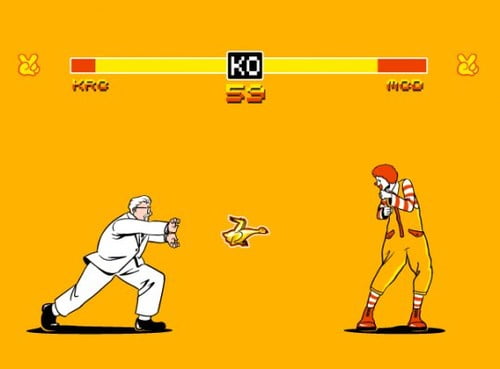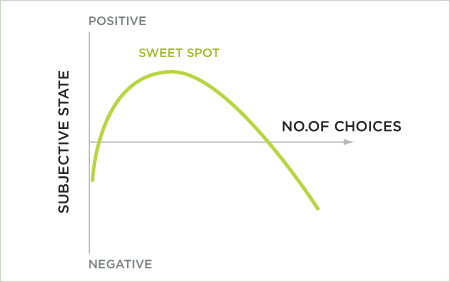Recently, there’s been a lot of debate about the freedoms that all human beings are entitled to. Whether it be freedom of expression, freedom of choosing your profession, or even the freedom of deciding what wallpaper should go up on your room.
Clearly, choice is inherent to freedom. The choices we make in life are what make us ‘who we are’ as an individual. Its why a growing number of people want to forge their destiny unencumbered from the influence of their parents, relative etc.In today’s day and age, there is no dearth of choice. Picture this: you’re sitting at home and want to eat out. If this were 20 years back, you’d probably make a trip to your local Nirulas’ or to a nearby joint. Now, however, you name a food item and you’ll find it. From KFC to Subway to the recently inaugurated Burger King, chances are that you’ll spend more time thinking about where you want to go versus actually eating there.
So technically, we all should be happier, right ? More choices = more freedom = higher satisfaction, that’s technically how it is supposed to be. Not really say psychologists. You can attribute such mind games to the phenomenon of the Paradox of Choice.
THE WHAT ?
The paradox of choice is a behavioral occurrence frequently observed while examining the decision-making process. To explain it to you, I’m going to use the example of the extremely famous ‘Jam Experiment’ conducted by psychologists Sheena S. Iyengar and Mark R. Lepper
Two different tasting booths for high quality jams were set up at a supermarket, one consisting of 6 different varieties of jam and the other having 24. However, in both cases, all 24 varieties were available for purchase.
The gist of the entire exercise is that more variety =/= more purchases. The same number of jams were tasted at both counters and in fact, a HIGHER proportion of people ended up buying jam in the case where there were only 6 varieties available.
The researchers were surprised. Honestly speaking though, its not a very groundbreaking conclusion. How many times have you walked into a store to purchase something and walked out because you were too overwhelmed to browse through choices? Or thought that you would be better off buying the same item from a Store C because they have a discount scheme going on or because there’s a 3-for-1 policy they follow. Too much freedom hath messed up thy mind.
THE PARADOX OF DISAPPOINTMENT
As Britney Spears once said, there’re only 2 kinds of people in the world. In this case, social psychologists have classified them into ‘Satisficers’ and ‘Maximizers’.
1. Satisficers : People who settle for the ‘this is good enough’ option. This type choose the kind of jam/burger/yogurt that exceeds some base level of satisfaction.
2. Maximizers : People who seek out the ‘best possible’ course. Also referred to as optimizers in economics.
Now it’s entirely possible that you’re a little bit of both.
If you’re like me, you’ll maximize when you’re buying food and be a satisficer when your semester results come out.
Barry Schwartz proposes that if you’re a maximizer like Mr. Burns, you’ll probably be forever searching for the best possible option, which in turn can lead to a bigger tendency to be unhappy, because well, the sky is the limit.
However, if you’re Homer ‘satisficer’ Simpson and are out there looking for a good burger and beer, you’re more likely to be happy with what you have and less muddled by choices.
http://www.gifbin.com/981140
(Not that being a maximzer is bad. Pretty sure Steve Jobs didn’t get Apple to where it is today by saying bas bahut ho gaya)
FOREVER CONFUSED ?
Not really. I’ve said this before, most theories, especially in the social sciences, are continuously evolving. So even though more choice, more often than not is annoying, it can also be a good thing.Here’s an easy way of understanding it. Suppose you’re out to buy an epensive box of luxury chocolates for your other half on Valentines’ Day. If you’re a layman with no idea of the kind of overpriced maal out there, you would either :
a. Mess up completely and get something horrible.
b. Don’t get anything at all (and then you don’t get anything either)
Either way, it’s unnecessary panga that can be easily avoided if you have a friend who is say, a chocolate connoisseur who can lend you a helping hand and save your relationship.
The same logic can be applied for a mutual fund investor. You will face trepidation if you’ll have to sit down and examine the bazillion investment portfolios available today. However, if you’re a brokerage firm and you get paid a living to do this, you’ve probably developed a system to wade through redundant information and find the most rewarding alternative.
And that is often (appropriately) named the ‘sweet spot’.
To conclude, it’s pretty obvious that there’s nothing I can tell you with 100% surety. However, as a parting advice, I would bequeath Professor Sheena Iyengar’s words to you ‘ Be choosy about choosing. If we are more aware of our choices, how much time we are spending on them, how we are categorizing them and why they should mean something to us, our decisions will improve and we will be more successful in the choices we make.’ I know it’s a lot of work, but nobody ever said that freedom comes without a price.
– By Gauri Gaur







































